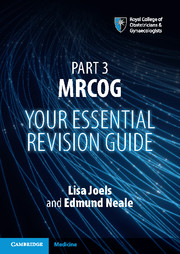Book contents
- Frontmatter
- Contents
- Foreword
- 1 The Part 3 Clinical Assessment in the Context of the MRCOG Examination
- 2 Core Clinical Skills
- 3 The Modules of the Curriculum Assessed in the Part 3 Exam
- 4 Tips for Candidates
- 5 Practice Tasks with Videos
- 6 Revision Resources
- Appendix 1 Part 3 MRCOG Clinical Skills Assessment Template
- Index
4 - Tips for Candidates
Published online by Cambridge University Press: 05 September 2016
- Frontmatter
- Contents
- Foreword
- 1 The Part 3 Clinical Assessment in the Context of the MRCOG Examination
- 2 Core Clinical Skills
- 3 The Modules of the Curriculum Assessed in the Part 3 Exam
- 4 Tips for Candidates
- 5 Practice Tasks with Videos
- 6 Revision Resources
- Appendix 1 Part 3 MRCOG Clinical Skills Assessment Template
- Index
Summary
This chapter is full of tips on preparing for an oral clinical examination. Many of the skills, in particular communication skills, required to pass the Part 3 exam need practice, so if you are reading this before sitting the written papers – well done! This gives you lots of time to prepare.
Usually, candidates will take up to six months to prepare for such important exams, so you need to develop a long-term strategy for passing the Part 3 exam. Your friends and family are essential in this process. They will provide you with support, reassurance and also with other activities to allow you time to relax and refresh so that you return to your studies with renewed enthusiasm.
If you are reading this having passed the Part 2 written exam, you've demonstrated that you have the knowledge required to meet the standards expected by the RCOG and now all you have to do is demonstrate your clinical skills to the examiners. Now you need to make a decision. Do you proceed to the Part 3 while the knowledge is fresh in your mind, or do you wait and prepare more fully for the clinical part of the exam? Ultimately the decision is yours, but we hope this chapter will help you decide what is right for you.
Don't Panic!
Every day in your routine clinical practice you are applying your clinical knowledge and thinking about patient safety in every decision you make. You are talking to patients and colleagues and gathering information as numerous clinical scenarios develop either slowly, such as in the outpatient setting, or rapidly, as in urgent care in obstetrics and gynaecology. These are the skills that will be assessed in the Part 3 examination, so if you are using these skills on a daily basis you should have no problem in passing the exam.
The MRCOG examination is aimed at the level of an ST5 trainee. You aren't expected to be an expert yet. An important aspect of patient safety is knowing when to call for help, and in some tasks you may fail if you don't inform your consultant just as you normally would in clinical practice. Calling for senior support is not a sign of lack of confidence or uncertainty about how to manage a problem.
- Type
- Chapter
- Information
- Part 3 MRCOGYour Essential Revision Guide, pp. 97 - 103Publisher: Cambridge University PressPrint publication year: 2016



